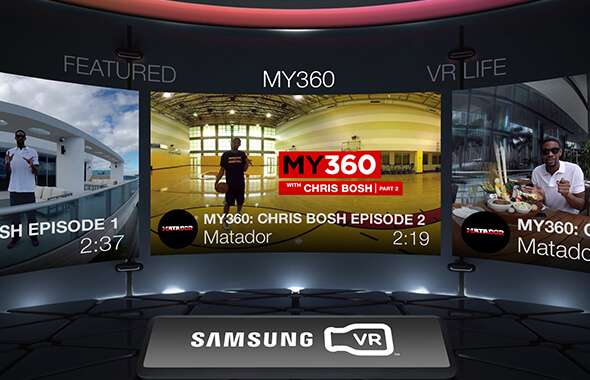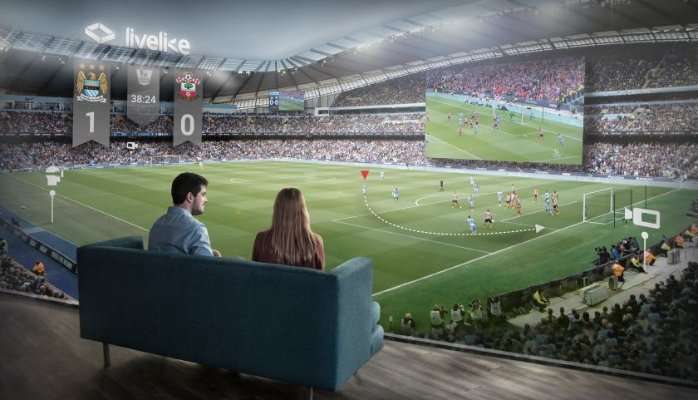Head of sports and strategic video for Samsung Asia paints his vision for the future
Before SportHackTag starts at the Emirates Stadium on 24 and 25 May, we had a chance to talk to one of the keynote speakers of the event, head of sports and strategic video services at Samsung Asia, Maurizio Barbieri.
Speaking from Singapore, Barbieri painted his perfect immersive virtual world as well as what he wanted to see from the big broadcasters.
Take a look at what he had to say;
So Maurizio, being at the coal face of the latest technology, what trends are you seeing?
Obviously, as you can imagine with what you’ve wrote about, there are two main trends here, one is purely the development of technology, whether it’s an improvement in broadcast offering, high definition, 4K, virtual reality – everyone is now looking at how they make something more immersive, more engaging etc.
The second one is that technology is now allowing basically anyone to become a broadcasters. Since YouTube’s emergence, we’ve had examples of companies that aren’t traditional broadcasters but purely digital going after sport because that’s the content that matters if you want to get market share, if you want to get subscribers or if you want to sell your device.
A prime example of this is what happened in New Zealand three years ago with Coliseum becoming the only company with the broadcast rights of the Premier League and it was only available via digital platforms in that country. Last year telecommunications company Optus acquired the rights to the Premier League in Australia and it’s happening all around the world.
On that point about the broadcasters, we’re seeing it more and more with Twitter, Facebook Live etc, is it completely undercutting broadcasters and are they in the traditional sense becoming obsolete?
In my opinion, the answer is a little bit more complicated than that. We’re moving towards a scenario or a landscape where the content is being moved digitally and that you will be able to transfer content into the devices of your choice, whether it’s a tablet or smart TV or headset etc.
I think that a broadcaster on TV that still thinks that people will come to it just because they’ve got the rights to a certain event, well they’re simply wrong .
What’s going to happen is that if this continues, more and more people will take advantage of these digital platforms but I wouldn’t say undercut. It’s just a matter of them altering their business model ie; instead of pricing something at $50 a month for a product in which I’m only interested in two events, they offer a deal like $5 or $10 a game for whatever entertainment I’m interested in.
I think the challenges here for the broadcaster is that to find ways not to be pushed out because at the end of the day, why do you subscribe to Sky or other networks? Because you want to watch a certain kind of content… And if that content isn’t there anymore than you might drop the subscription altogether. So it’s not like it’s a new thing, but the bottom line is the broadcaster needs to find ways to make sure supplying this kind of content.
What is it that broadcasters have to offer now?
That’s a good question and while I can’t speak for them, from my point of view and what I’d like to have from a broadcaster is the ability to pay for what I want to watch, not for what they want me to watch. If Fox Sports is giving me F1, great no problem, but I’m interested in this and not the other linear programming they might add.
I’d like to have the chance to say look this is the content that they have, if you want the chance to watch the next F1, then it is going to be $3 and you will be billed directly by Fox or whatever network it is. Otherwise there’s really no point for me to subscribe to a broadcaster.
Look at what is happening with BT and the Champions League Final. They want to have the maximum number of people watching this event and they know that the premium model is limited by default because not everyone is willing to pay for the BT package. But if something is free and users will be able to watch via a different platform, there’s nothing really wrong with it because BT will still be able to monetise this through advertising and benefit from this exposure. The same is happening on Twitter with the NFL deal.
That brings us to this virtual reality. Does VR bring broadcasters back into the ‘game’?
Well that is yet to be soon but as broadcasters are the ones producing the feed, they have an advantage because they can say that they’ll be having different angles etc. While that’s great and could be a step to improving the services they provide, we shouldn’t forget one important thing and that is that the 360 media immersive experience that’s currently flooding the market is not virtual reality because that term intimates something that I do in real life whilst in another environment that’s recreated digitally.
One of the big challenges that I see in virtual reality becoming mainstream is that not just the quality of the content you are able to access to but the ability to enjoy that content with other people. What you are doing now is just watching a game and if you’re by yourself, you’d most likely feel like using your phone or your computer to chat about it with someone, send a Whatsapp message, update your Facebook status, check your Twitter and so on.
The moment when you will be able to do all this stuff whilst you’re in the experience, that will be game changing because when I watch something, I want to watch something like I’m there, but I also want to make sure that I don’t miss out on the social aspect which is what a live sport event is all about. I want to watch it in a different way ie; VR, but, if my friend sends me a whatsapp message, I want to see it come up in the corner or if I want to send a message or pull up Facebook, it should give me the ability to do this.
Similarly, I want to be able to show up in this virtual stadium as a character decked out in the shirt of the team that I’m supporting. If I want to buy some goods, I want to be there and able to do it without having to take the headset off, I want to be able to be there so that it really offers the full experience.

So you’re talking virtual stadiums?
Virtual merchandising is already there, what I’m talking about is giving the deep sporting experience, exactly like in real life, it doesn’t need to be a stadium. My opinion is that watching a game in real VR not going to be any different to watching it in real life. Meaning that I could be sitting with my friends inside a VR experience, like I would sit with them around the couch or a sports bar.
Maybe we are in a virtual stadium or are in a place that I create in my room and I invite my friends, they come around and we enjoy the game and talk and exchange ideas and banter and we spend these two hours like if we were together in real life, but except that we are in different cities, different parts of the world. This allows me to have friends come over from New York or Europe or Australia and we all get together for 2 hours and then we disconnect and go back to real lives.
Is this on its way?
Look, I think that all the companies working in this industry are already looking at how to manage these interactions. They’re all looking at how to bring them all together (whatsapp, twitter, facebook etc) and it’s going to happen fairly soon because otherwise it wouldn’t be VR, it’d be a tank that I put myself in for a few hours, to watch something. Without real interaction with anyone, the novelty factor will wear off.
Is VR here to stay?
Oh definitely, it’s not a gimmick. Where 3D went wrong is that if you try to host a sports party and invite say 20 people around and you all put on your glasses. If you look at each other, you miss out on what’s happening in the game.
When it comes to VR, it’s just a method of the companies coming up with the best way to allow us to recreate our real lives digitally, it’s already happening.
Look at second life, a few years back everyone was talking about second life, all of a sudden, nobody cares. These people have not gone away but the technology will allow them to actually take that experience to a totally different level. You will be able to talk to other people, you will be able to make, receive phone calls when watching something.
If we think this is the VR tech from 15 years ago, we are wrong, it’s not the lawn mower men, it’s the mavericks.
About author
You might also like
SPORTEL 2021: Day One Recap
This year’s prestigious SPORTEL convention kicked off in sunny Monaco today, welcoming a host of familiar faces as well as plenty of new ones. Doors opened at 8:30am with businesses
Six Founding Riders Set To Bring The Vision Of The UCI Track Champions League To Life
Olympic Champions, UCI World Champions and World Record holders join the new track cycling competition debuting in November 2021 The UCI Track Champions League is delighted to announce that six
Sports related spending to soar this summer as pre-pandemic life resumes
New insights from eBay Ads UK reveal the potential for brands to engage with an excited but nervous nation as sports events get back on track As pubs and indoor








